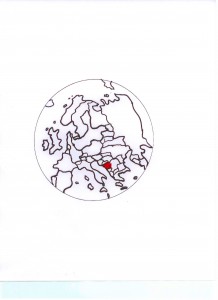BOSNIA AND HERZEGOVINA
A. THE COUNTRY
Bosnia and Herzegovina is a mountainous country in southeast Europe, on
the Balkan Peninsula. Government is a parliamentary democracy. The
breakup of Yugoslavia (Bosnia was one of six federal units) led to the
three-sided civil war among Serbians, Croatians and Bosnians from
1992-1995, only the latest in a long cycle of violence. There was no
winner to this war which shattered Bosnia’s fragile agricultural
infrastructure. There still needs to be appropriate justice for war
criminals at large. Massive population movements, wholesale destruction
and disruption of communications sank the economy further. Foreign aid
is still important, and tourism is growing. Only organized crime
syndicates do well for themselves, and these must be shut down if Bosnia
hopes to join the EU (which is seen as a financial windfall).
B. THE PEOPLE
The population is ~3,759,000 and the official language Bosnian. Many
have been displaced due to civil war, and only a minority have returned
to their old homes, effectively entrenching ethnic partitions.
C. RELIGIONS AND CHRISTIANITY/PENTECOSTALISM
Religious communities are as entrenched as ever and deeply divided along
ethnic lines. Orthodoxy has been subverted by Serb nationalism, and
Catholicism by Croat nationalism. Militant Wahhabism from the Middle
East is replacing the previous European, Sufi-influenced moderate Islam
of Bosnia. ~54.16% are Muslim, ~40,98% claim to be Christian, ~4.85%
Non-religious, ~0.01% Jewish.
In the Christian category:
~28.19% are Orthodox, ~12.58% Catholic, ~0.07% Protestant, ~0.07%
Unaffiliated, ~0.07% are considered ‘marginal’, ~0.03% Independent.
Evangelicals represent ~0.1% of the population.
Charismatics represent ~0.1% and of those <0.1% are Pentecostals.
Donna Siemens
References:
http://en.wikipedia.org
Operation World, Jason Mandryk. Colorado Springs: Biblica Publishing, 2010.

